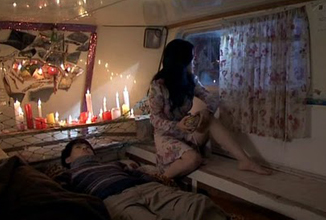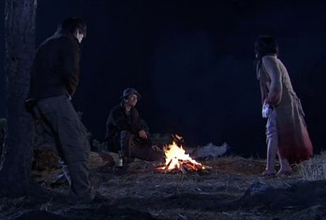"I'm the righteous defender of a whore... and I can't even f*ck! I'm the scum of the earth!"
Synopsis:
Rosie is a sweet, intelligent five year old girl who is doted on by her father Man-su (Park Eun-soo). Since the death of her mother, she and Man-su have been almost inseparable, often visiting Lookout Point together, where her mother was laid to rest. However, Man-su is on the wrong side of the law, and while on 'a job' one night, he has little option but to leave Rosie in the care of a prostitute friend while trying to escape from the police, who are quickly closing in on him. It's July 31st, and he faithfully promises Rosie that he will return for her the next day, telling her that he will bring her a doll and take her to Lookout Point to make amends for having to leave her there overnight. Looking at a calendar on the wall she replies "Tomorrow? On July 32nd?"
In his continued attempts to evade the authorities later that night, Man-su badly injures police inspector Chang (Kim Jung-kyun) before finally being arrested and thrown in jail. Inspector Chang's career is subsequently destroyed as a direct result of his injures and, in an act of pure revenge, he decides to decimate Man-su’s life by abducting Rosie and selling her into prostitution.
Fifteen years later, Rosie (now played by Seung Hye-rim) continues to be forced to sell her body for money; is becoming increasingly ill; and, believing that it is her father who's to blame for the life she's forced to live, is still desperately waiting for July 32nd to arrive, so she can kill him....
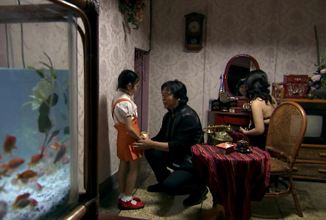 |
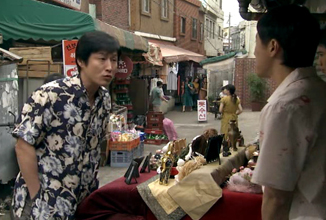 |
Review:
If you've ever had 'one of those days' where life itself seems to be conspiring against you (and, let's face it, who hasn't?), then spare a thought for Rosie, whose life for the past fifteen years has presented her with an continuous, seemingly endless, array of detestable and enforced situations which she finds both abhorrent and unbearable. Though still only in her early twenties, the world she has inhabited since being sold into prostitution (and forced to sell her body to pay an ever-increasing debt that isn't hers), has not only wearied her and worn her down, but also diseased both her mind psychologically and her body physically, to the extent that she is utterly without hope for the future, has virtually given up on life, and has even attempted suicide on more than one occasion. Her growing ill health is of next to no consequence to her, save the thought that if she does die from her medical condition, at least she'll finally be free.
In fact, almost the only thing that keeps her going from one day to the next is the determination to find her father (whom she holds solely responsible not only for everything she currently faces, but also for the destruction of the possibilities of the life she was never allowed to have), and exact murderous revenge. I say 'almost the only thing' because, somewhere deep within this (justifiably) embittered, angry and vengeful young woman, lies the little girl she once was, and that child still makes herself known on many occasions - whether they be moments of relative calm, or indeed times of deep-rooted need - requiring Rosie to quickly back-track to hide the little girl's continuing existence in her subconscious.
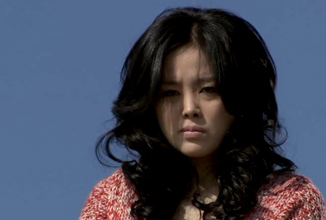 |
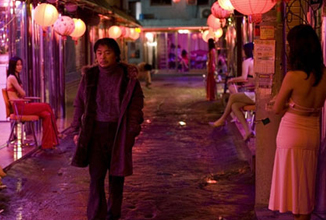 |
Case in point: Unaware that the man she propositions in the street is, in reality, her father, Rosie invites him to her room to have sex, even offering it for free. Man-su clearly isn't comfortable with the whole situation and has no intention of sleeping with her (even though he too is unsure of her true identity), but he eventually agrees to accompany her there in the hope of discovering if she could possibly be his daughter. In the ensuing conversation that takes place between them, he asks Rosie her age, and without a second thought, she blurts out "I'm six", instantly recoiling and attempting to gloss over her statement by aggressively barking that she isn't sure of her exact age but that she's "around twenty or so".
Not only that, but it could also be said that her increasing willingness to offer her body in return for money - out of pity, to repay a kindness, and/or even just to be wanted - is both a result of its ingraining in her psyche during the fifteen years she has been forced to sell herself, and also proof that the little girl she once was is screaming out, offering the only thing she has to give, in a cry to be loved and rescued.
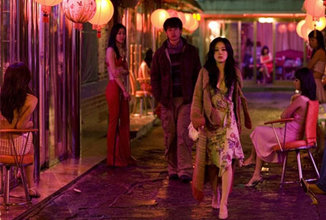 |
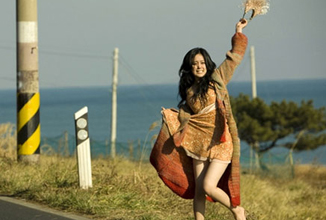 |
From Rosie's point of view, July 31st was the day her life ended - as did the lives of both her father (who spent the ensuing years in prison making a doll for Rosie and hopelessly waiting for a visit from the six year-old who ceased to physically exist long ago) and the man who abducted and sold Rosie, who subsequently lost his job, his family and the respect of his local community - and though the subconscious co-existence of Rosie as a grown woman with the child she once was, make uncomfortable bed fellows within her, it is clear that both the adult Rosie and the child still firmly believe that July 32nd is not only real, but also that it cannot fail to eventually come. However, while they both desperately wait for it to finally arrive, the question increasingly becomes whether that day will be the day Rosie kills her father, or the day her father saves his little girl.
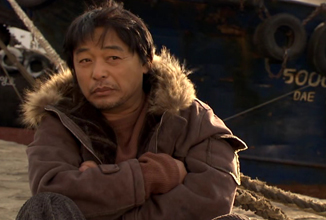 |
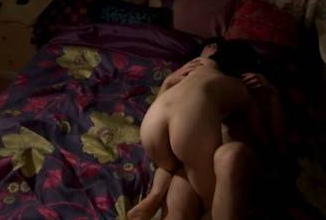 |
July 32nd is easily one of the darkest and bleakest films to come from South Korea in 2010, but in this case that is very much in its favour. The main characters' pain (both mental and physical) is palpable throughout the entire running time of the film, allowing for an almost unprecidented level of viewer empathy to be elicited, for both Rosie and her father, even though most audience members will never have been in situations remotely similar to either.
The story itself is fairly straightforward, but is utterly gripping throughout and while viewers may initially think that they've seen many films with similar plotlines and themes before, those viewers will ultimately discover that July 32nd stands head and shoulders above the vast majority with ease.
Nothing in the plot is forced or contrived, and at no point are we pushed or expected to feel specific emotions. We are simply told Rosie and her father's story in a subtle, almost understated, manner; allowed to make our own judgements; and, as a result, feel those emotions we do.
While a number of the scenes are both visceral and brutally violent, and though happiness is an long lost feeling for any of the characters (having been completely replaced by pain), both Rosie and her father are portrayed so believably that we follow every trial and tribulation without question and willingly forgive their past mistakes and indiscretions without hesitation.
As the conclusion of July 32nd drew near, I was convinced that proceedings would end in one of two ways (and thanks to the deftness of the storytelling on show, I would have been content and satisfied with either), but director Jin Seung-hyeon exquisitely pulls the rug out from under the usual melodrama template to produce a conclusion which is at the same time original, utterly surprising and truly heartbreaking.
Summary:
There is no happiness whatsoever in July 32nd, and a bleaker film would be quite an effort to find, but a story this poignantly satisfying and deftly executed cannot fail to grip like a vice, breaking the heart and remaining in the mind long after the credits roll. Astounding.
Cast:
While July 32nd tells the parallel stories of Rosie and her father, hers easily requires the greatest character depth and, as such, the performances of the two actresses (child and adult) are pivotal to the believability, and indeed success, of the plot.
The portrayal of six year-old Rosie is yet another example of the utterly jaw-dropping performances routinely given in South Korean cinema by young children, and is nothing less than astonishing coming from a little girl, so young. The nuances with which she shows Rosie's character traits (from her repeated eye contact and tentative glances, through to her ability to show genuine caring, and even to the tiny, repeated, nervous steps she takes as she tries to convince herself that her father will return for her the next day) are utterly faultless and, seemingly effortlessly, elicit viewer empathy from the very first moments of the film. Her incredible performance also serves to help Seung Hye-rim's portrayal of Rosie as a grown woman, and adds to her (also accomplished) characterisation of this bitter and desperately unhappy young woman to add up to give an overall picture of this woman in almost three dimensions, within a tale that viewers become truly invested in. Seung Hye-rim is also required to spend a significant amount of screen time naked and note should be made of the natural, unabashed way in which she plays these rather graphic scenes.
The portrayal of Rosie's father is required to be far less involved but is, nonetheless, equally vital to proceedings, and Park Eun-soo’s performance certainly doesn't disappoint. There is also noticeable chemistry between him and both actresses allowing this painful story of a father and daughter to really resonate within viewers' minds, and ultimately break their hearts.
The rest of the cast play very much supporting roles (to a greater or lesser degree), and all but one perform admirably, easily stepping up to the mark: The only cast criticism which can really be levelled at July 32nd is in Kim Jung-kyun’s performance of inspector Chang. He rather overplays his part to almost the point of caricature, and though his below par performance doesn’t detract from the overall effect of the film, it is rather noticeable, nonetheless.
Cast:
Park Eun-soo, Seung Hye-rim, Kim Jung-kyun, Kim Min-gi
Director: Jin Seung-hyeon
DVD:
The DVD used for this review is the Korean, Region 3, single disc release from PreGM which has an anamorphic transfer presented with an aspect ratio of 1.85:1. The picture is clear throughout and is free of ghosting and image artifacts.
The sound is provided as a choice of Dolby Digital 5.1 and Dolby Digital 2.0, both of which are crisp and and clean and compliment the soundtrack well throughout.
The English ubtitles provided
are fairly good throughout the majority of the main feature, with only minor grammatical errors appearing on a couple of occasions.
There
are no special features provided as part of this DVD release.
DVD Details:
Actors: Park Eun-soo, Seung Hye-rim, Kim Jung-kyun, Kim Min-gi
Directors: Jin Seung-hyeon
Format: Anamorphic, Colour, PAL, Subtitled, Widescreen
Region: Region 3
Number of discs: 1
Classification: Category III (Korean Film Classification
Studio: PreGM
Run Time: 100 mins (approx.)
|










